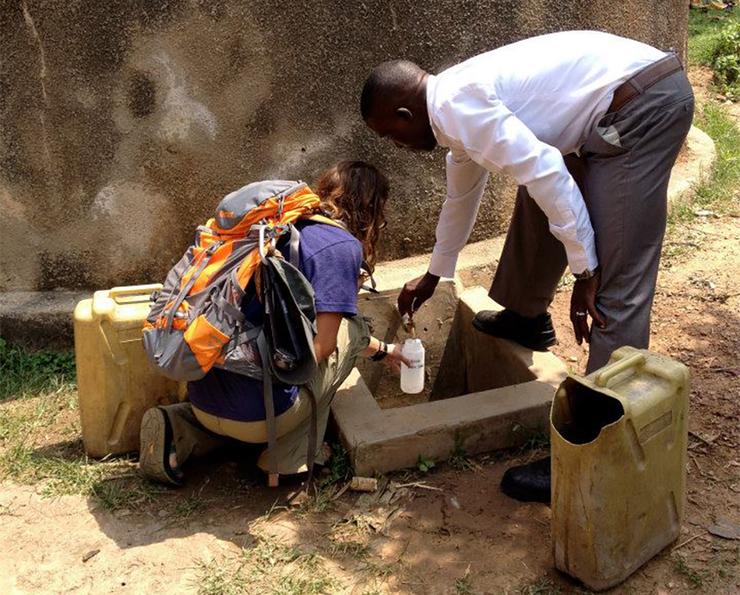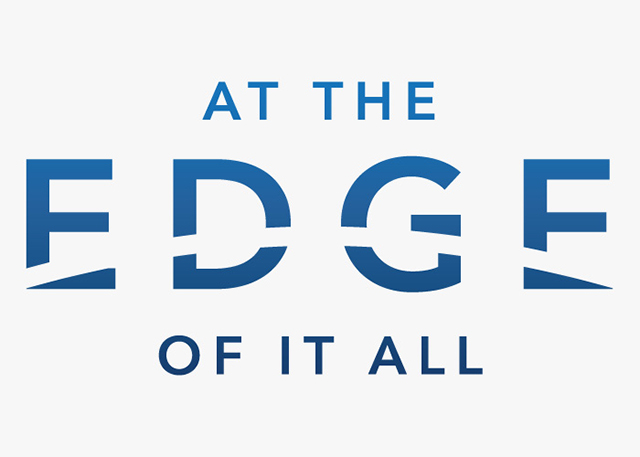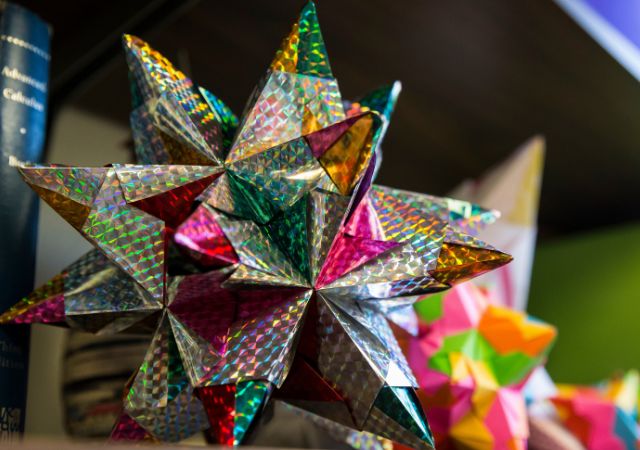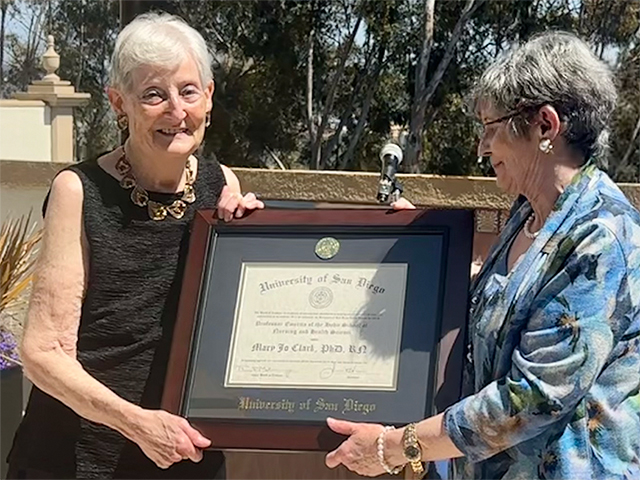Making a Difference: Chemistry Professor Leads Water Quality Project in Uganda
 USD faculty and students have spent the last decade working on a project to help provide clean water in Uganda. Here, a USD student from a past trip works with an Uganda student to get a water sample.
USD faculty and students have spent the last decade working on a project to help provide clean water in Uganda. Here, a USD student from a past trip works with an Uganda student to get a water sample.When there is a problem, the logical way to solve it is to first recognize it and then respond, accordingly. Sounds simple, right?
The problem, in this case, is access to clean water for people living in the African landlocked country of Uganda. It's a part of the world James Bolender, PhD, a chemistry professor at the University of San Diego, was first introduced to by then colleague Anita Hunter, a professor and director of international nursing at USD’s Hahn School of Nursing and Health Science.
When Hunter got involved in a project near Mbarara, Uganda in 2006 — an Archbishop sought her help with the creation of a children's hospital, Holy Innocents — Bolender got involved only after Environmental and Ocean Sciences Professor Michel Boudrias, PhD, was unable to go on an exploratory trip to Uganda in 2008.
"Anita initially approached Michel about Uganda, but I went instead. It was my first trip to Uganda and I got hooked," Bolender said.
His goal on the trip was to test the quality of a body of water near the hospital. Bolender, who had collaborated previously with Boudrias on a water-quality project in Baja California dating back to 2000, took an immediate interest in Uganda's plight.
"It's a very different marine environment," Bolender said. "You can see the impact that water has on people. In Baja, you'd see it, but the fishermen could always go out further to get away from the pollution. In Uganda, the people need the impacted water to drink on a daily basis. The sanitation is still issue number one, no question, but there are a lot of underlying chemical issues that people are ignoring because there is such focus on sanitation."
Today, Bolender is the veteran leader of USD’s work to provide a solution for cleaner and more accessible water in Uganda. Hunter left USD for other educational opportunities before retiring. Meanwhile, Bolender has been back to Mbarara and Kampala annually, sometimes with a study abroad class of chemistry students, sometimes as a business trip with fellow USD faculty members to provide fresh perspective through an interdisciplinary lens and to establish local connections.
Bolender’s most recent sabbatical enabled him to spend three months in Uganda deepening and strengthening his commitment to a project that works in partnership with allies in Uganda — including the Mbarara University of Science and Technology — and building a group of experts from New Zealand, France, Israel and the United States who have joined the effort for potential water purification.
"The University of San Diego has worked in Uganda and the Mbarara region over the past decade and all of the partners in this international collaboration have extensive experience addressing various challenges around the world," Bolender said.
It’s now January 2020 and Bolender's newest visit is here. This time, he will have USD President James T. Harris, Mary Harris, faculty members Frank Jacobitz from the Shiley-Marcos School of Engineering and Martha Fuller from the Hahn School of Nursing, eight USD students — nursing practitioner students, one engineering student and four chemistry students, including two students who are back for a second straight year to help lead the lab's data collection and water testing efforts.
Furthermore, USD’s Assistant Director of Digital Communications and Editor of USD News Center, Ryan Blystone, is traveling alongside to get a firsthand account of this unique and valuable project.
The trip will take us to Entebbe, Kampala and Mbarara and more. We will connect with people in these communities through Catholic Church contacts. There will be a meet-up with a USD doctoral alumnus from the School of Leadership and Education Sciences who founded the AidChild Leadership Institute; We'll visit a refugee camp; nursing students will do clinics and visit Holy Innocents; There will be input from students, President Harris, and faculty members as they take in this experience.
Merely testing the water for updated data isn't enough. Bolender knows that tackling the water quality problem requires action and to garner support to move the needle.
"In Mexico, I saw the integration that was needed for the sciences to work together. In Uganda, I see the integration that's needed across all disciplines to address the problems. It can't just be a chemistry approach."
And it won't. Bolender said the traditional approach to addressing poor water quality in the developing world needs to change. It is more than just sanitation and hygiene issues or about drilling wells for groundwater.
"Washing one's hands or boiling water will not help if the water being used for washing, cooking or drinking is already contaminate,” he said. “Naturally occurring contaminants like uranium, arsenic and other metals are endemic in southwestern Uganda, and few groups concerned with water-quality issues attempt to address the problems caused by these contaminants."
Purifying the water is the solution, Bolender said. Utilizing public health, engineering innovation, technology and providing opportunities and resources for Ugandan college students to do valuable research that can, in turn, help their fellow man, woman and child, is a dream recipe for success.
Bolender and others have the passion. As you read this and, hopefully, follow USD News Center coverage this month, you'll have a better understanding of not only problems, but also understand the critical need for supporting this effort to make life better and safer in Uganda and, most importantly, make a difference in our world.
— Ryan T. Blystone
Ryan T. Blystone will be providing regular updates for USD News Center from Uganda in January.
Contact:
USD News Center
news@sandiego.edu
(619) 260-4681



